
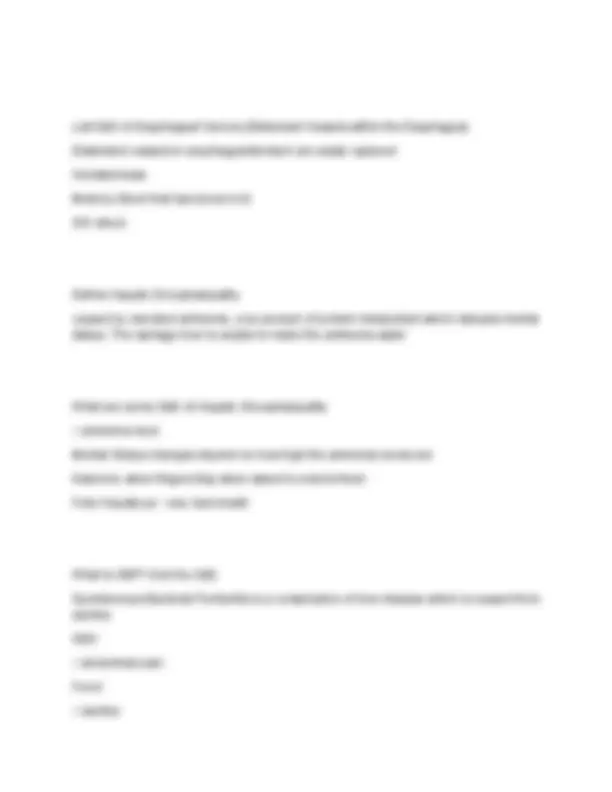
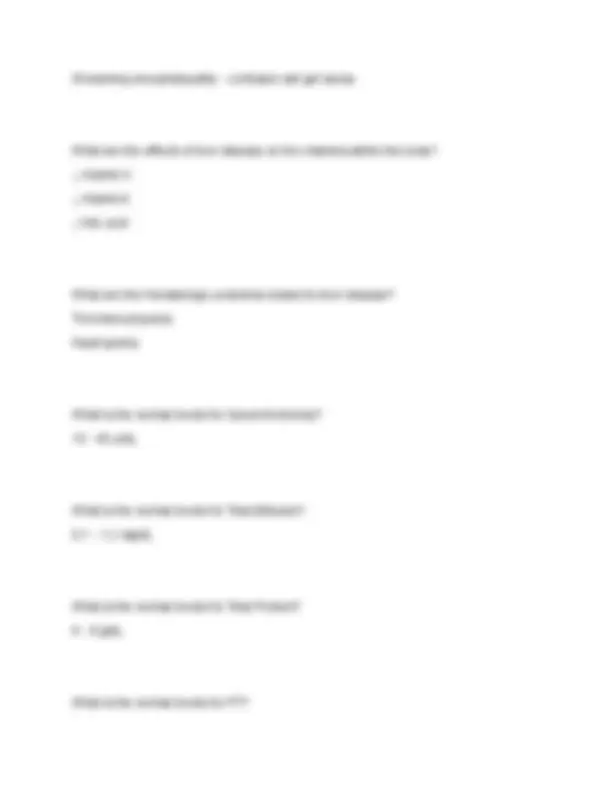
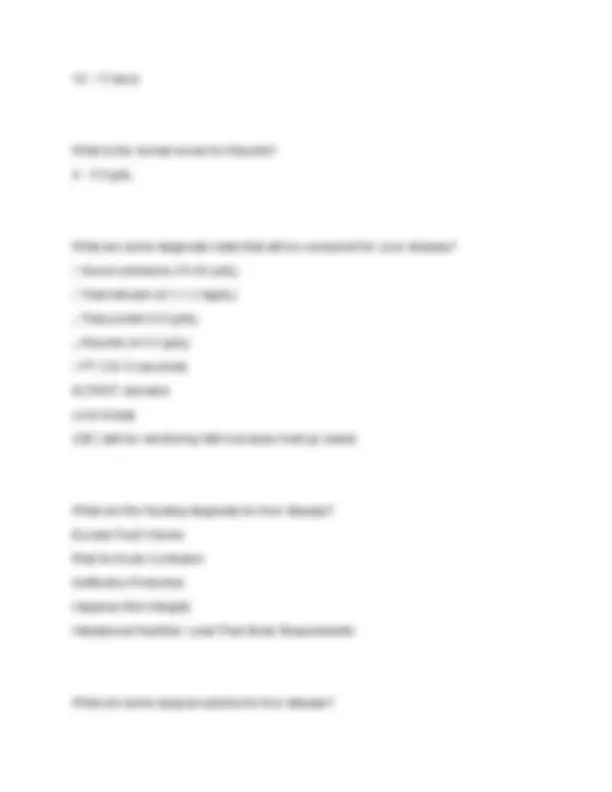
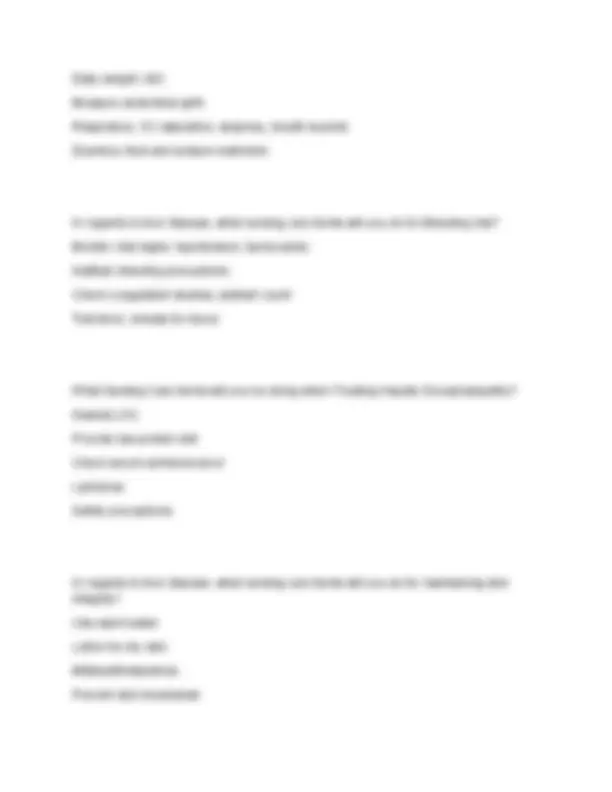
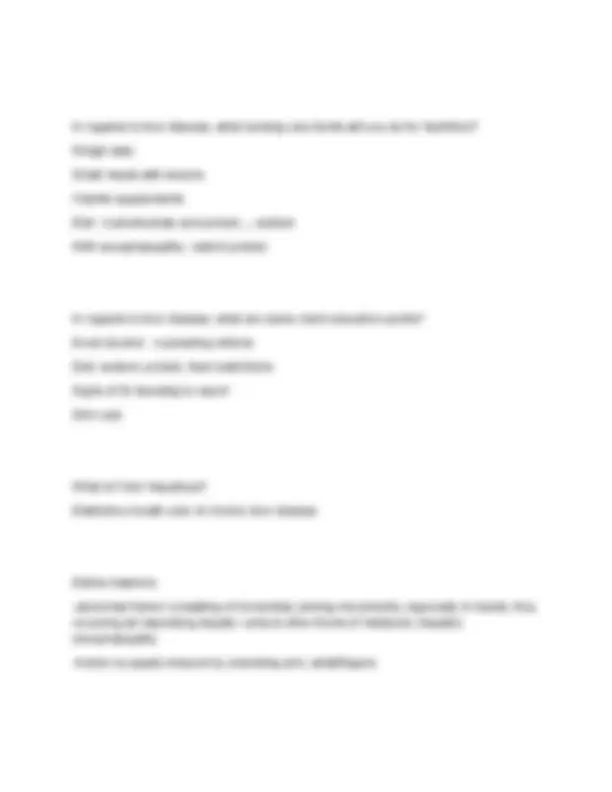
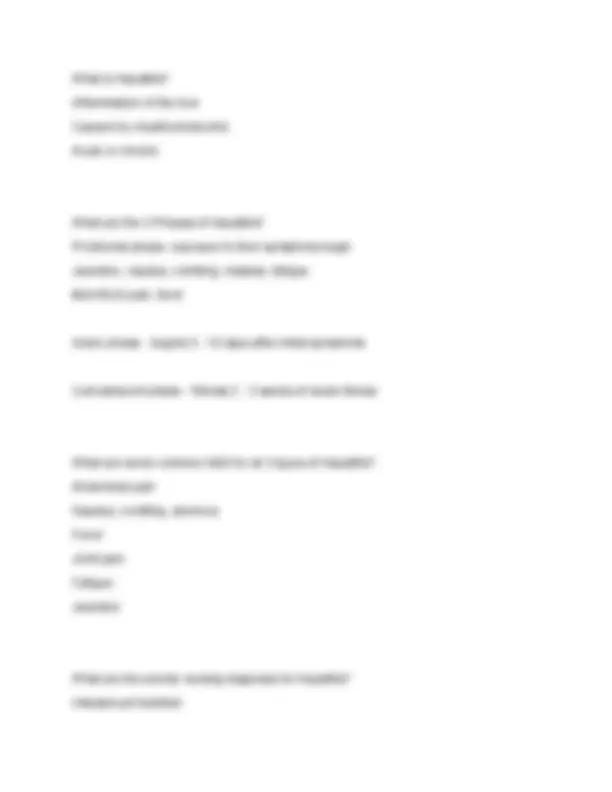
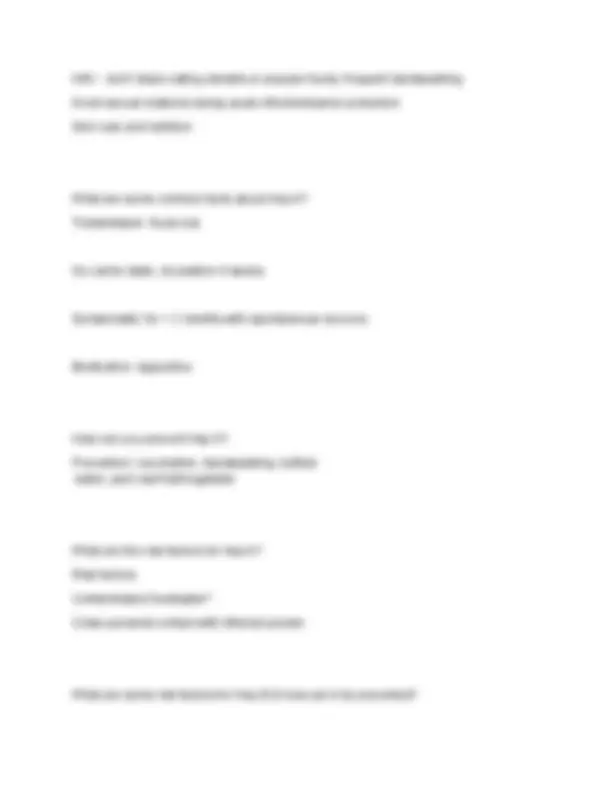
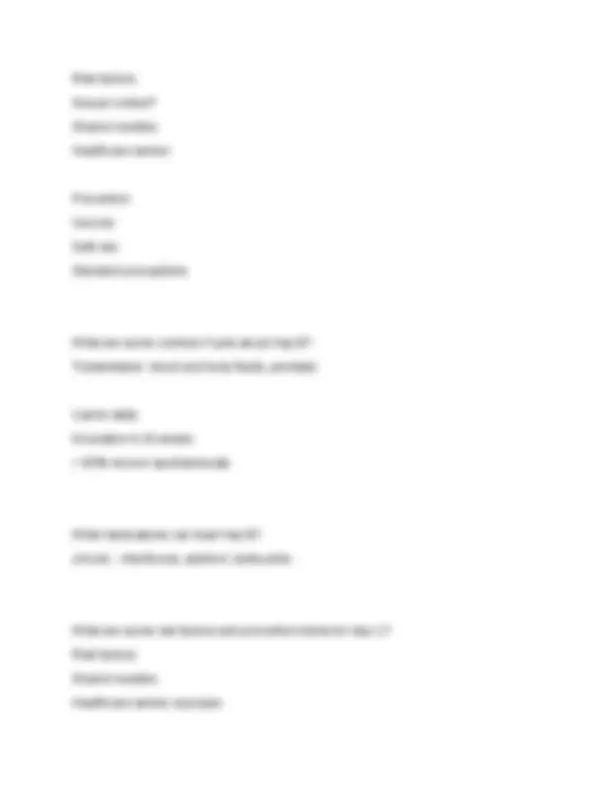
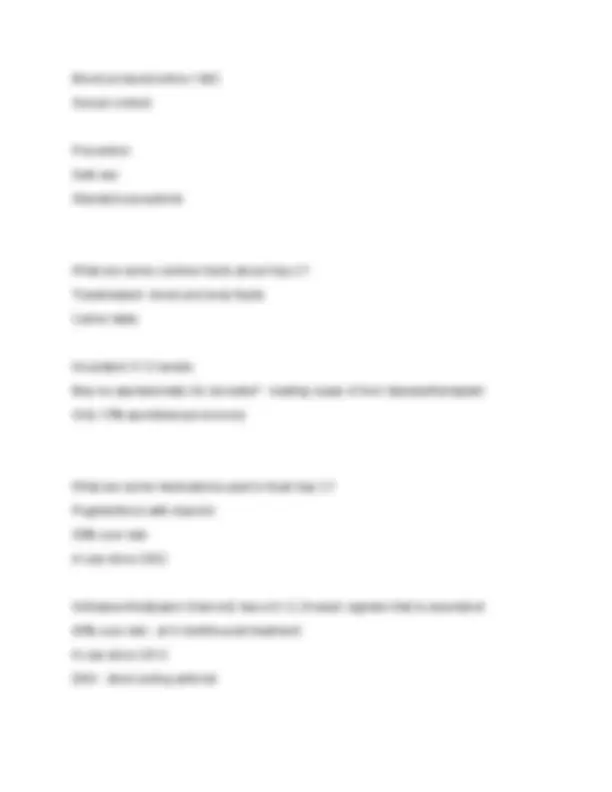
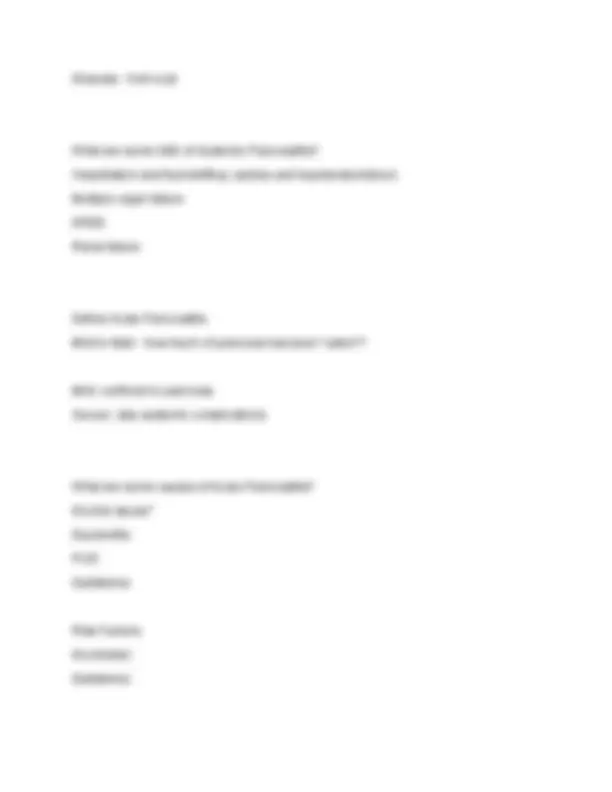
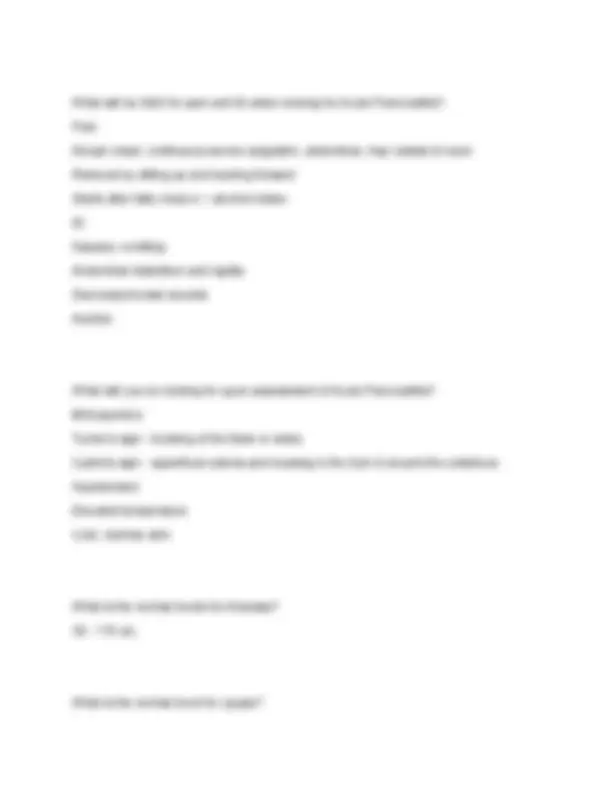
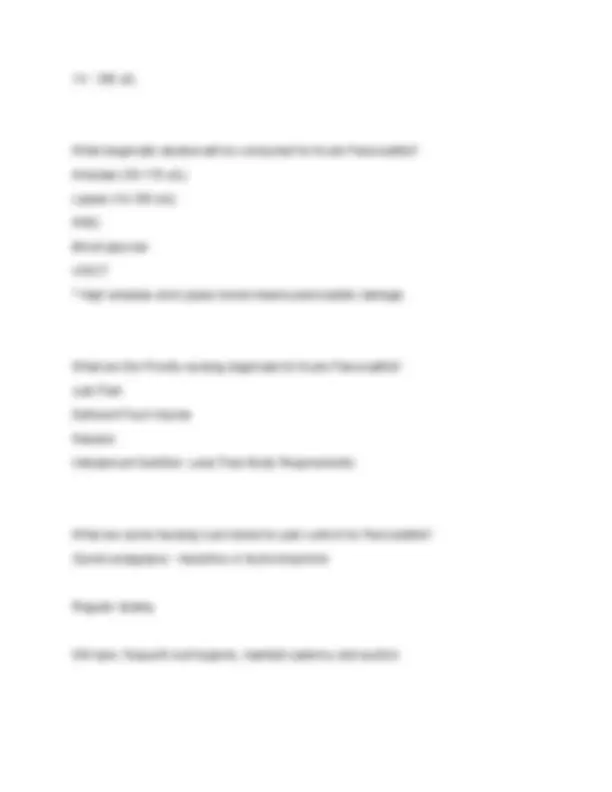
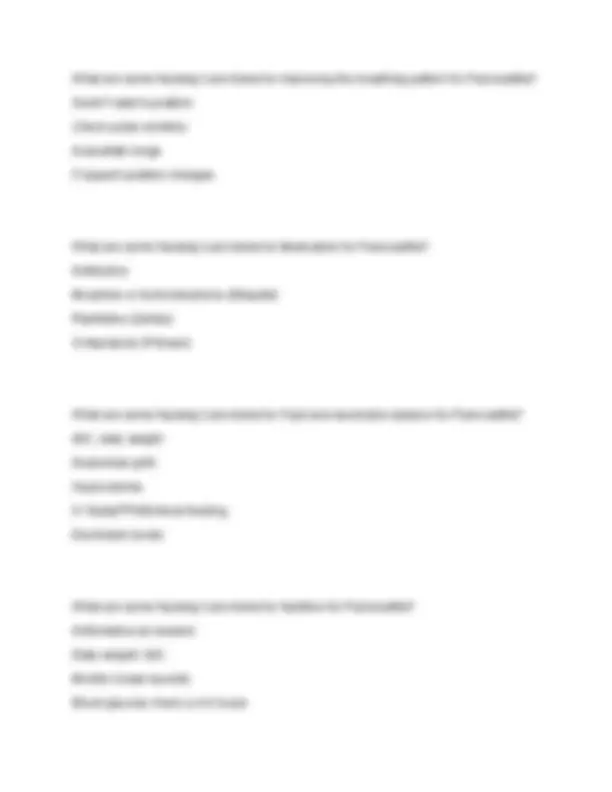
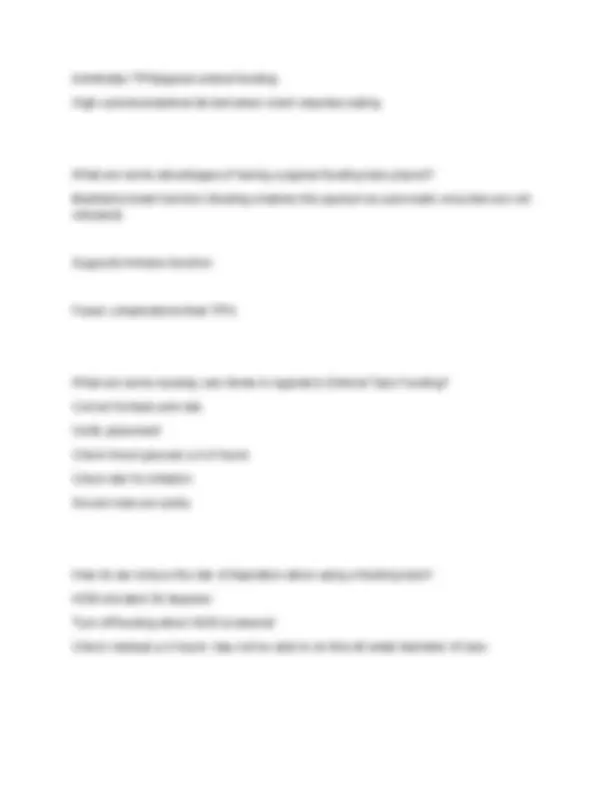
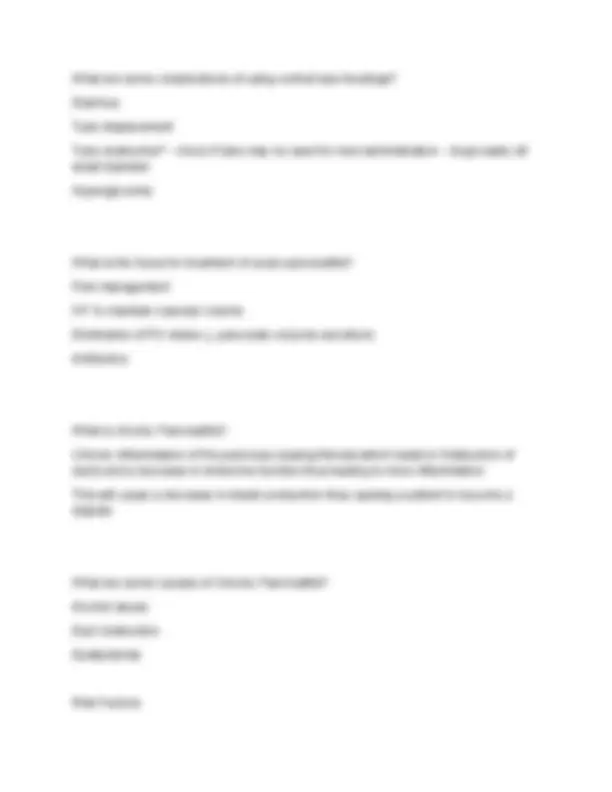
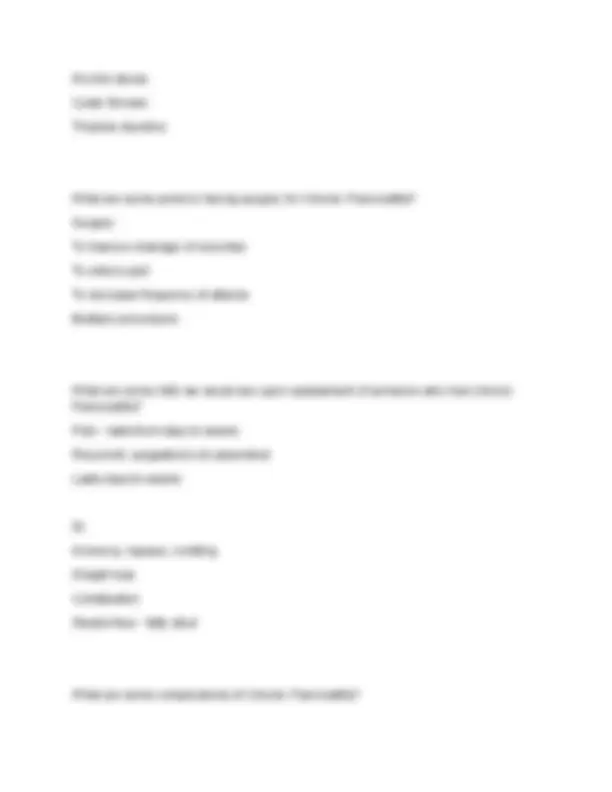
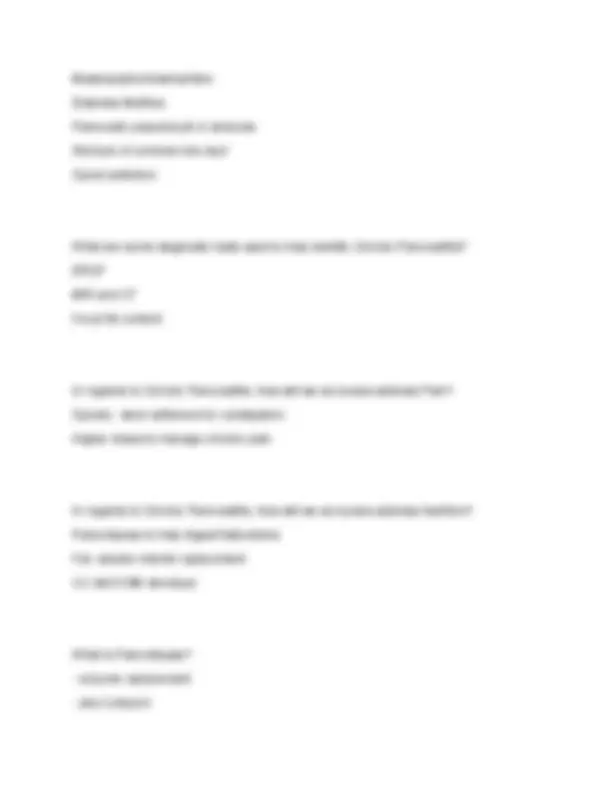
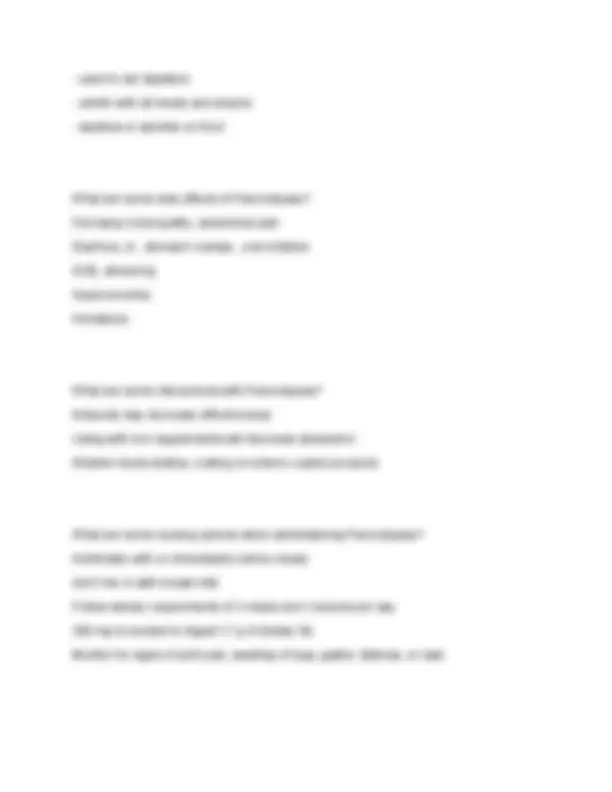
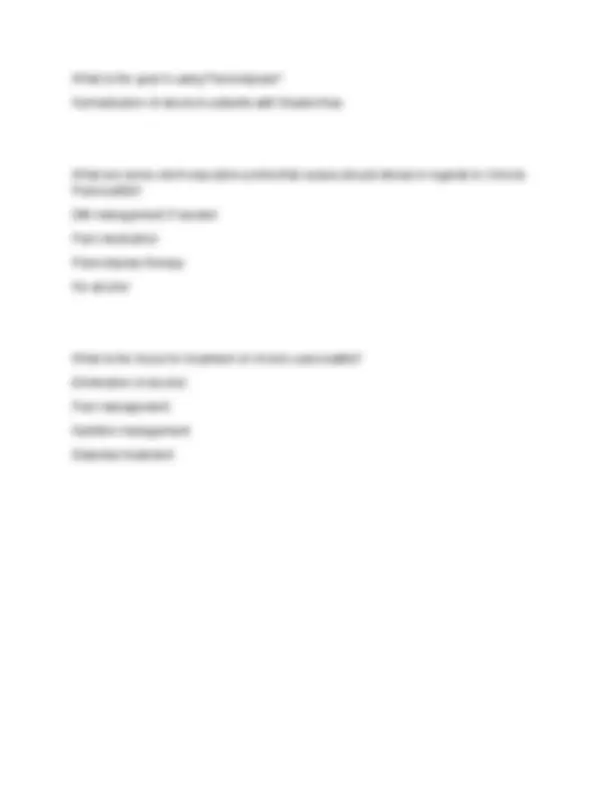


Study with the several resources on Docsity

Earn points by helping other students or get them with a premium plan


Prepare for your exams
Study with the several resources on Docsity

Earn points to download
Earn points by helping other students or get them with a premium plan
Community
Ask the community for help and clear up your study doubts
Discover the best universities in your country according to Docsity users
Free resources
Download our free guides on studying techniques, anxiety management strategies, and thesis advice from Docsity tutors
HACC Nursing 241 Quiz 1/2024_2025
Typology: Quizzes
1 / 27

This page cannot be seen from the preview
Don't miss anything!




















HACC Nursing 241 Quiz 1 What does the liver do? Metabolism Glucose Albumin Ammonia to urea Vitamins Drugs Bilirubin excretion Production of clotting factors What kind of effects do liver disorders have on the body? ↓ effectiveness of 'chemical factory' ↓ excretion of bilirubin Portal hypertension = esophageal varices and ascites (Portal Hypertension is caused from blood back up in the liver b/c of scar tissue within the liver) What are the 3 most common problems caused by liver disease? Bleeding Problem - ↓ clotting factors Toxin Problem - Increased Ammonia and Bilirubin Fluid Problem - Increased fluid retention
What is Cirrhosis of the liver caused by and is it reversible? Most commonly caused by Alcohol Abuse, Viral Hepatitis, or Medication and it is NOT reversible What are the risk factors for Cirrhosis? Alcohol Abuse Chronic Hep B & C Acetaminophen Use IV Drug Use(b/c of contracting Hep B &C) What are some assessment findings for a person with a liver disease? Enlarged Liver/ RUQ pain. / Jaundice Spider Angioma Pruritis Striae on Abdomen Petechiae Define Ascities Na+ and Water Retention 3rd Spacing ↓serum albumin ↑abdominal girth Weight gain Pedal edema Dyspnea
Worsening encephalopathy - confusion will get worse What are the effects of liver disease on the vitamins within the body? ↓ vitamin K ↓ vitamin A ↓ folic acid What are the Hematologic problems related to liver disease? Thrombocytopenia Neutropenia What is the normal levels for Serum Ammonia? 15 - 45 u/dL What is the normal levels for Total Bilirubin? 0.1 - 1.2 mg/dL What is the normal levels for Total Protein? 6 - 8 g/dL What is the normal levels for PT?
10 - 13 secs What is the normal levels for Albumin? 4 - 5.5 g/dL What are some diagnostic tests that will be conducted for Liver disease? ↑ Serum ammonia (15-45 μ/dL) ↑ Total bilirubin (0.1-1.2 mg/dL) ↓ Total protein 6-8 g/dL) ↓ Albumin (4-5.5 g/dL) ↑ PT (10-13 seconds) ALT/AST elevated Liver biopsy CBC (will be monitoring H&H because it will go down) What are the Nursing diagnosis for liver disease? Excess Fluid Volume Risk for Acute Confusion Ineffective Protection Impaired Skin Integrity Imbalanced Nutrition: Less Than Body Requirements What are some surgical options for liver disease?
Belching Cramps Distention Flatulence Diarrhea Hyperglycemia - in Diabetic patients Don't use with other laxatives Anti-Infectives may Decrease effectiveness in treatment of Hepatic Encephalopathy What are some nursing actions needed when administering Lactulose? Abdominal & Stool Assessment Mental Status Assessment Monitor Electrolytes especially K+ which will decrease , and Na+ which will increase What are some teaching items when administering Lactulose? Adjust dosage so that patient has 2 - 3 soft BMs/ day Can mix with liquids to mask taste. Can be given PO or Enema What is the goal of Lactulose? The clearing of confusion, apathy, and irritation and improved mental status in PSE: with in 2 hrs of Enema or 24-48 hrs for Oral In regards to liver disease, what nursing care items will you do for Balanced Fluid volume?
Daily weight, I&O Measure abdominal girth Respiratory: O2 saturation, dyspnea, breath sounds Diuretics, fluid and sodium restriction In regards to liver disease, what nursing care items will you do for Bleeding risk? Monitor vital signs: hypotension, tachycardia Institute bleeding precautions Check coagulation studies, platelet count Test stool, emesis for blood What Nursing Care items will you be doing when Treating Hepatic Encephalopathy? Assess LOC Provide low-protein diet Check serum ammonia level Lactulose Safety precautions In regards to liver disease, what nursing care items will you do for maintaining skin integrity? Use warm water Lotion for dry skin Mitts/antihistamines Prevent skin breakdown
What is Hepatitis? Inflammation of the liver Caused by virus/toxin/alcohol Acute or chronic What are the 3 Phases of Hepatitis? Prodromal phase- exposure to then symptoms begin Jaundice, nausea, vomiting, malaise, fatigue Mild RUQ pain, fever Icteric phase - begins 5 - 10 days after initial symptoms Convalescent phase - follows 2 - 3 weeks of acute illness What are some common S&S for all 3 types of Hepatitis? Abdominal pain Nausea, vomiting, anorexia Fever Joint pain Fatigue Jaundice What are the priority nursing diagnosis for Hepatitis? Imbalanced Nutrition
Risk for Impaired Skin Integrity Infection Fatigue Deficient Knowledge Nausea What is the normal Value for ALT? 4 - 36 units / L What is the normal levels for AST? 0 - 35 units / L What is the normal level for Total Bilirubin? 0.1 - 1.2 mg/dL What Diagnostic Tests will be increased with Hepatitis? ALT (4-36units/L) AST (0-35 units/L) Total bilirubin (0.1-1.2 mg/dL) What are some nursing care items for Hepatitis That relate to Fever and pain, and nutrition?
HAV - don't share eating utensils or prepare foods, frequent handwashing Avoid sexual relations during acute infection/barrier protection Skin care and nutrition What are some common facts about Hep A? Transmission: fecal-oral No carrier state, incubation 4 weeks Symptomatic for < 2 months with spontaneous recovery Medication: supportive How can you prevent Hep A? Prevention: vaccination, handwashing, bottled water, peel raw fruit/vegetable What are the risk factors for Hep A? Risk factors Contaminated food/water* Close personal contact with infected person What are some risk factors for Hep B & how can it be prevented?
Risk factors Sexual contact* Shared needles Healthcare worker Prevention Vaccine Safe sex Standard precautions What are some common Facts about Hep B? Transmission: blood and body fluids, perinatal Carrier state Incubation 6-24 weeks
95% recover spontaneously What medications can treat Hep B? chronic - interferons, adefovir, lamivudine What are some risk factors and prevention items for Hep C? Risk factors Shared needles Healthcare worker exposure
What disease can chronic Hep B and C increase your risk for? Cirrhosis Liver failure Liver cancer What is the goal of drug therapy when treating Hep atitis? The goal of drug therapy is to the viral load and so prevent repeated episodes of inflammation that cause these complications. What is paracentesis? removal of fluid from the abdominal cavity What are some Pre-procedure items a nurse will need to take for a paracentesis? Check for signed consent form Instruct Patient to void Gather supplies and place patient in upright position at edge of bed with feet supported on a stool - or- Fowler's portion if confined to bed Place Sphygmomanometer Cuff around Arm (BP cuff) What are some Intra-procedure items a nurse will need to take for a paracentesis? help client remain still during procedure Measure and record BP throughout procedure periodically Monitor for signs of vascular Collapse
What are some signs of Vascular Collapse? Increase pulse (HR) Decreased BP What are some Post-procedure items a nurse will need to take for a paracentesis? return patient to bed or place in a comfortable sitting position Measure, describe and record the fluid collected Label any samples collected and send to lab Monitor vitals every 15 mins for 1 hour Then every 30 min for 2 hours; then every 4 hrs Assess site for bleeding, leakage, hypovolemia, mental status, and encephalopathy Stress the importance of not lifting anything and moving slowly Define Pancreatitis When the pancreatic enzymes digest the pancreases instead of nutrients within the duodenum What are some S&S of LOCAL Pancreatitis? Edema Inflammation Bleeding - digestion of vessel walls Cyst - in pancreas/abdomen
What will be S&S for pain and GI when looking for Acute Pancreatitis? Pain Abrupt onset, continuous severe epigastric, abdominal, may radiate to back Relieved by sitting up and leaning forward Starts after fatty meal or ↑ alcohol intake GI Nausea, vomiting Abdominal distention and rigidity Decreased bowel sounds Ascites What will you be looking for upon assessment of Acute Pancreatitis? Mild jaundice Turner's sign - bruising of the flank or sides Cullen's sign - superficial edema and bruising in the Sub Q around the umbilicus Hypotension Elevated temperature Cold, clammy skin What is the normal levels for Amylase? 30 - 170 u/L What is the normal level for Lipase?
14 - 280 u/L What diagnostic studies will be conducted for Acute Pancreatitis? Amylase (30-170 u/L) Lipase (14-280 u/L) WBC Blood glucose US/CT